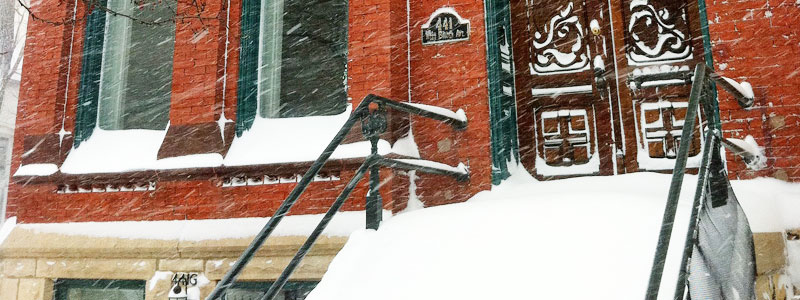Who’s Responsible for an Injury on a Muncie Rental Property?

Muncie is a college town, and in college towns, rental properties thrive. As such, rental property owners have certain responsibilities to ensure a safe environment for their renters. If an owner is made aware of a hazard and fails to address it in a reasonable amount of time, then they could be held responsible if someone is injured as a direct result of the unaddressed hazard.
One of the most common accidents that may occur due to property owner negligence is a slip and fall accident. But how do you know if the property owner is responsible for your slip and fall? Let’s take a look at two common injury scenarios.
Scenario One

Outside of John’s apartment complex is the air conditioner for the building that serves residents and businesses. With the weather changing from brutal winter one day to warm springtime the next, the air conditioning unit is melting and freezing from the condensation. The unit itself happens to be next to a popular path on the way to the front entrance of the building.
John noticed this and while he was paying his rent, he said something to the landlord about putting some salt down or looking into replacing the unit if there was a leak. Today it’s a cold morning again, and John is getting ready to leave for classes but goes out to start his car to warm it up. As he is turning the corner, he slips on the ice patch from the frozen condensation of the air conditioning unit.
John decides to play it safe and take the day off from both school and work. Unfortunately, one day turns into the entire week as his pain gets worse. He goes to the doctor and learns that he has injured himself much worse than expected.
What to Notice About John’s Situation
One of the first things to note is that the landlord is responsible for all aspects of the property, not just the building in which you live. The air conditioning unit was not inside the apartment complex, but as part of an amenity of the unit, the landlord is responsible for its maintenance.
Furthermore, since John reported the concern and dangerous hazard to his landlord, the landlord has now been aware of the condition. By reporting the condition, it is the landlord’s responsibility to prevent the hazard or fix it. Since the landlord did not make the effort, John could have a case against his landlord for negligence. With the help of a Muncie personal injury attorney, John could fight to make sure that the landlord’s insurance company takes care of his medical bills instead of his own insurance.
Scenario Two

Jane has several people over in her apartment for a small dinner party. There are stairs in her apartment, but with everyone moving around, people can become clustered together on the stairs as they are moving from the kitchen to the living room quickly. One of her friends is in a hurry and trips over a rug Jane has on the stairs. Her friend falls down the stairs and hits her head, hard, on the wall.
What to Notice About Jane’s Situation
In Jane’s story, it is important to point out that the accident with her friend happened in her apartment unit. Anything within the unit you pay for is your responsibility. The landlord can’t control whether or not Jane puts a rug on the stairs; as a renter, it’s her responsibility to ensure her decorations and furniture are safe for guests. In this case, because the accident happened in the renter’s unit itself, the landlord is not responsible.
Hire a Muncie Personal Injury Attorney
During your next apartment search, have some conversations with the landlord about how fast they fix issues or what the turn-around is to have something replaced. It is good to have those conversations so you know how seriously they take your safety into consideration. In the event that a landlord doesn’t ensure your safety and their negligence results in an injury, reach out to the attorneys at Hensley Legal Group to see what your options are. You can call or contact us online for your free consultation.
Available 24/7
Free Case Review
You won’t pay any fees until we win your case.
It’s easy - you can: